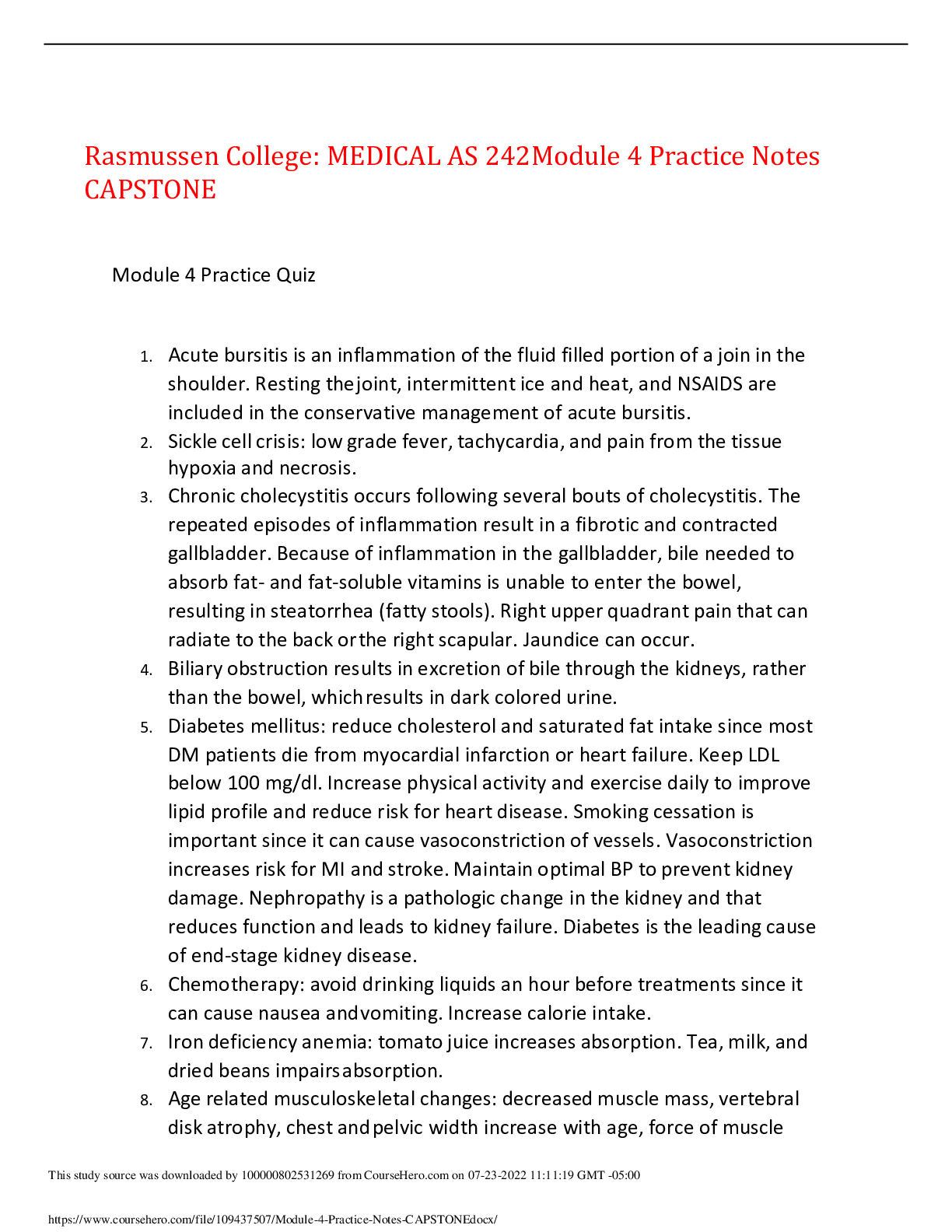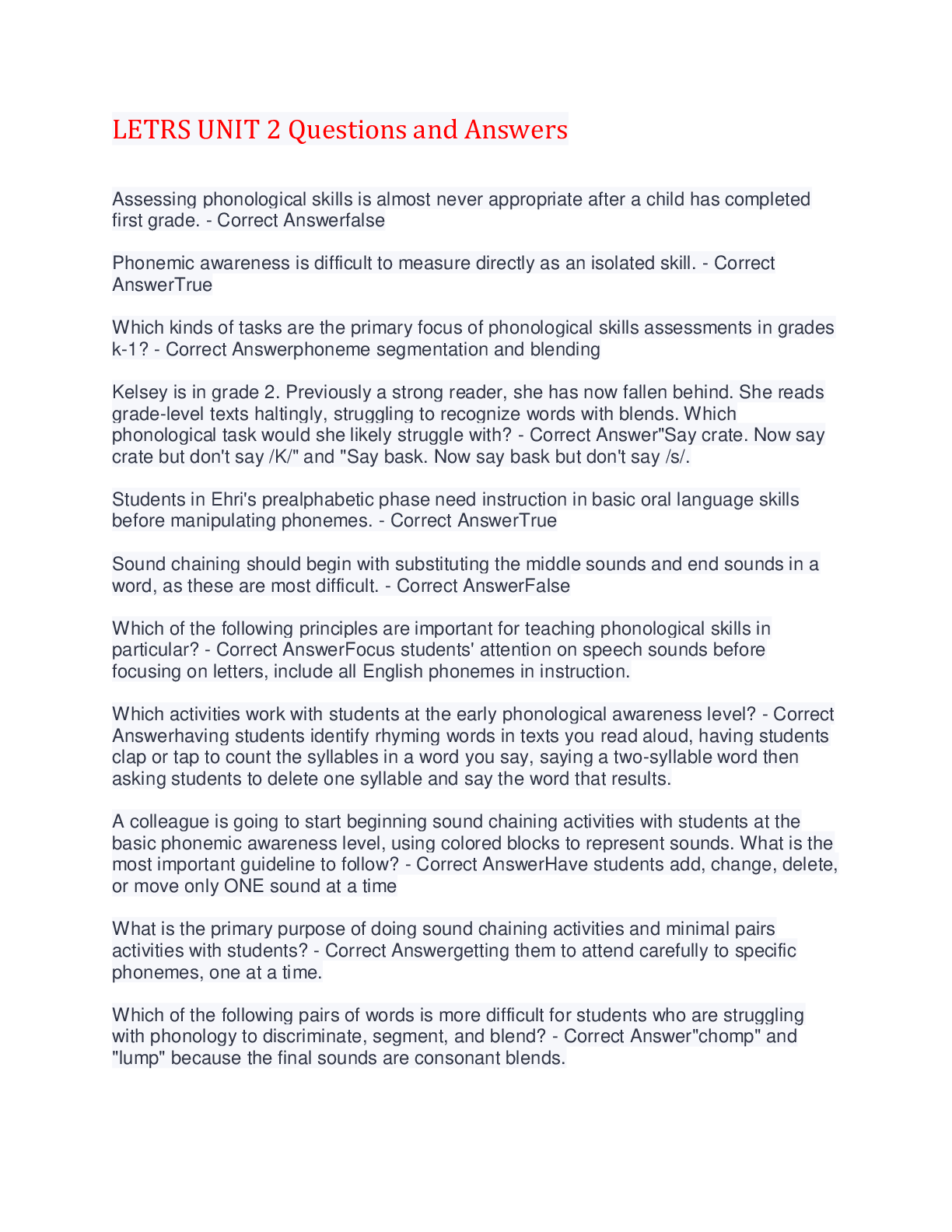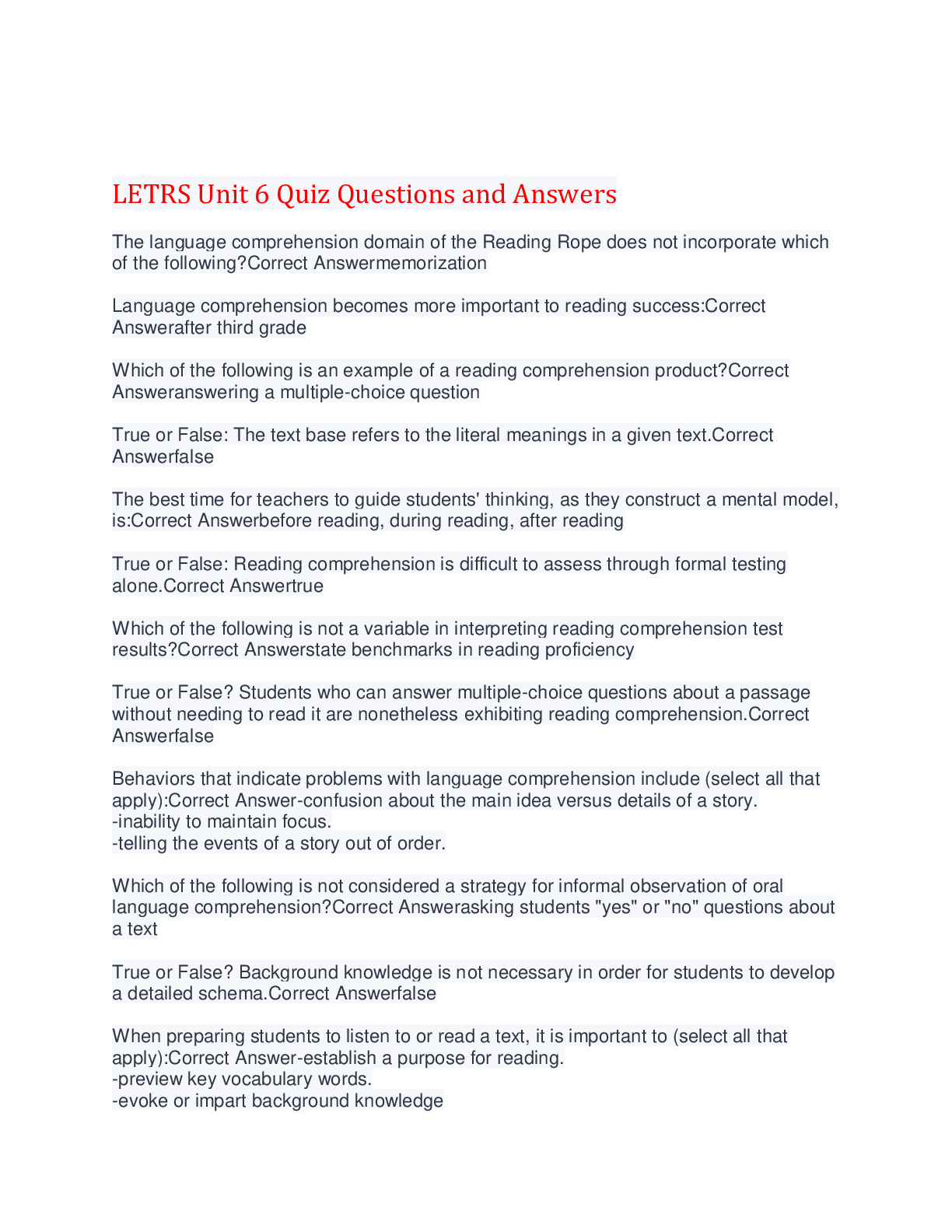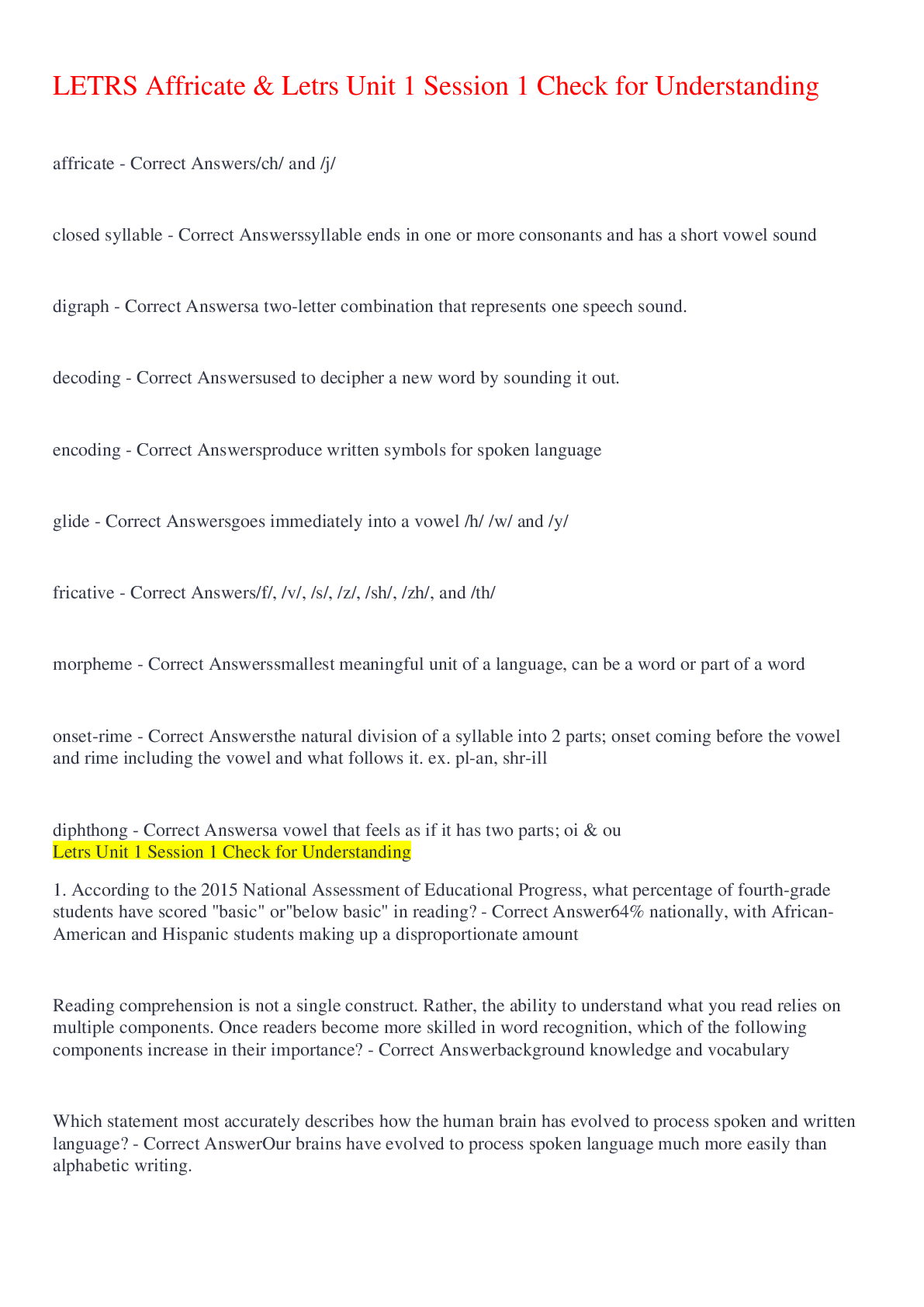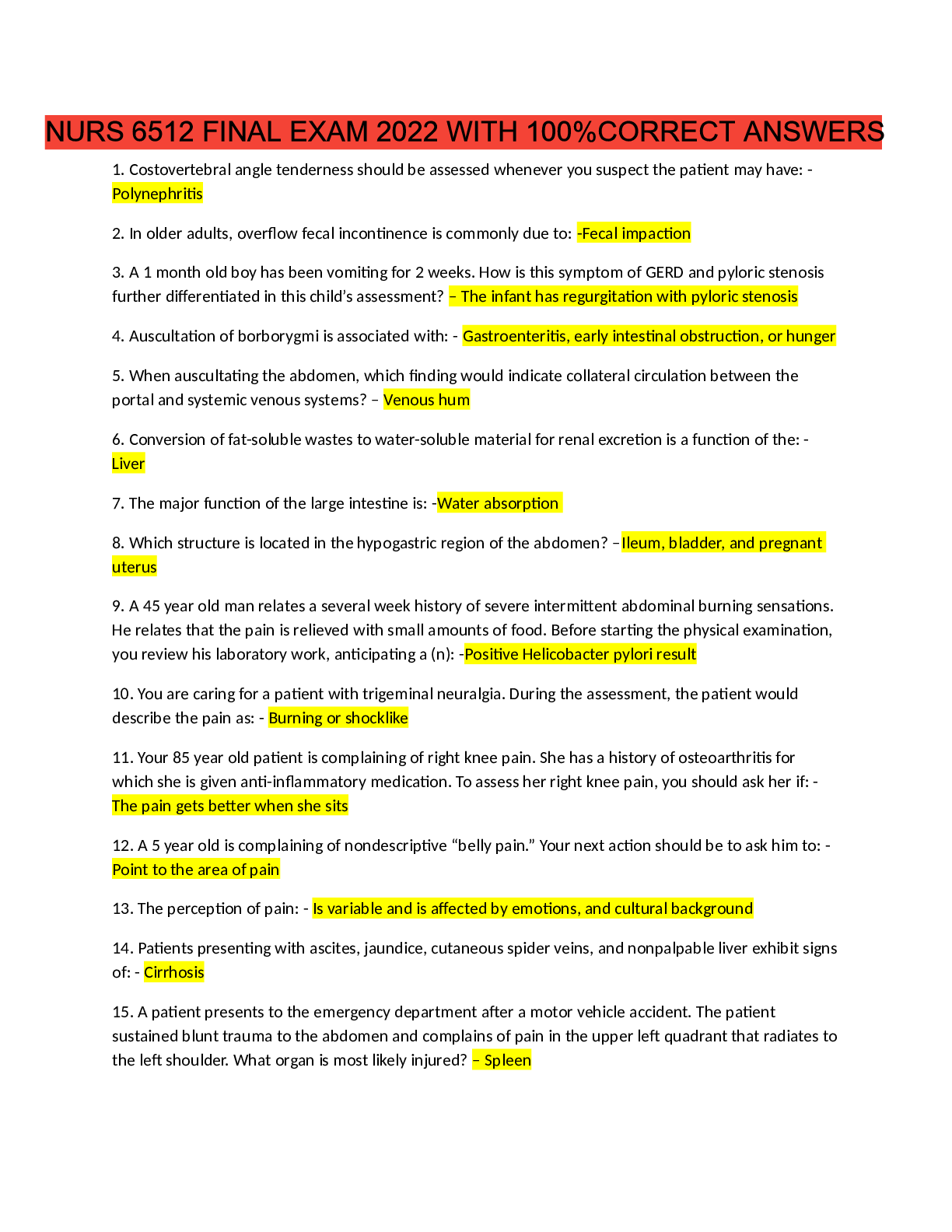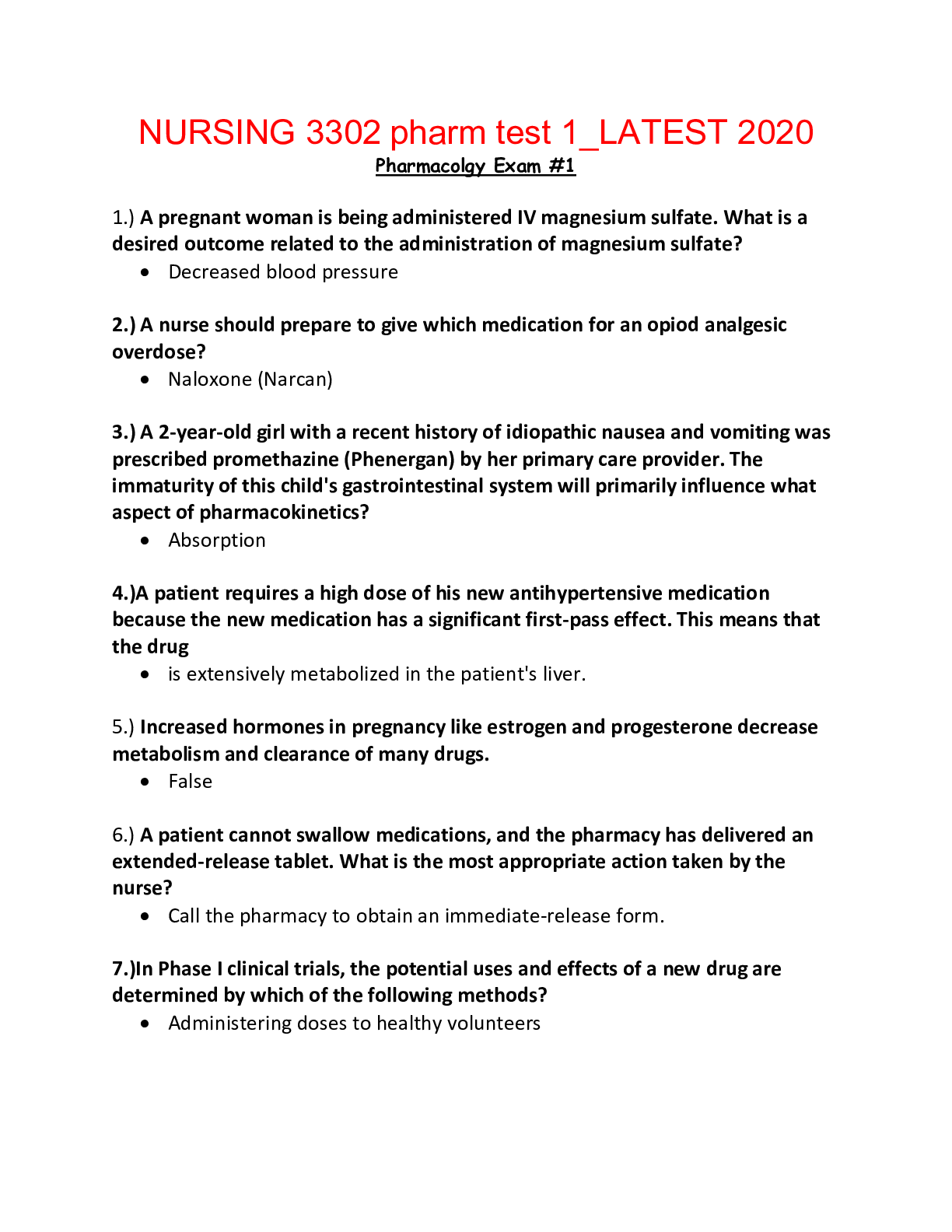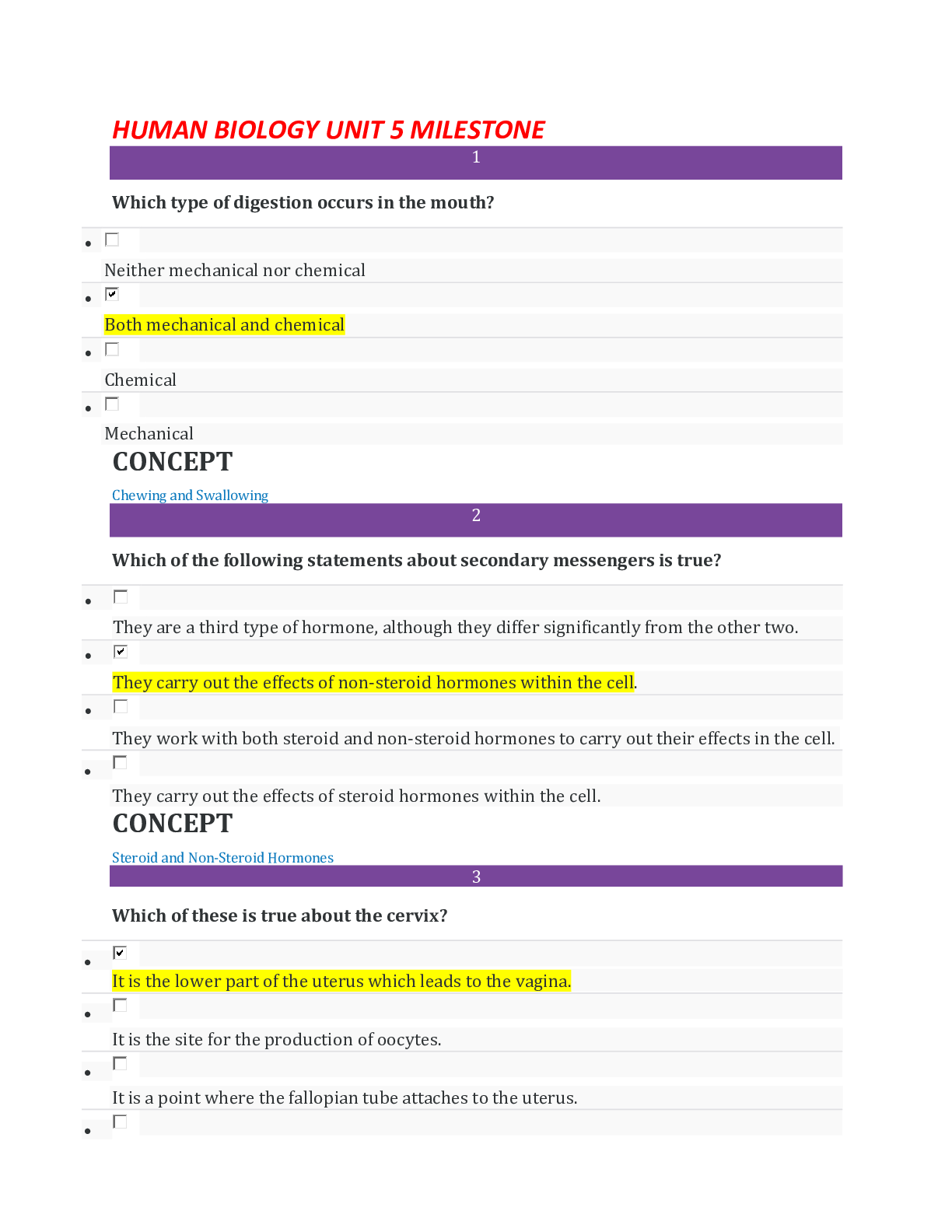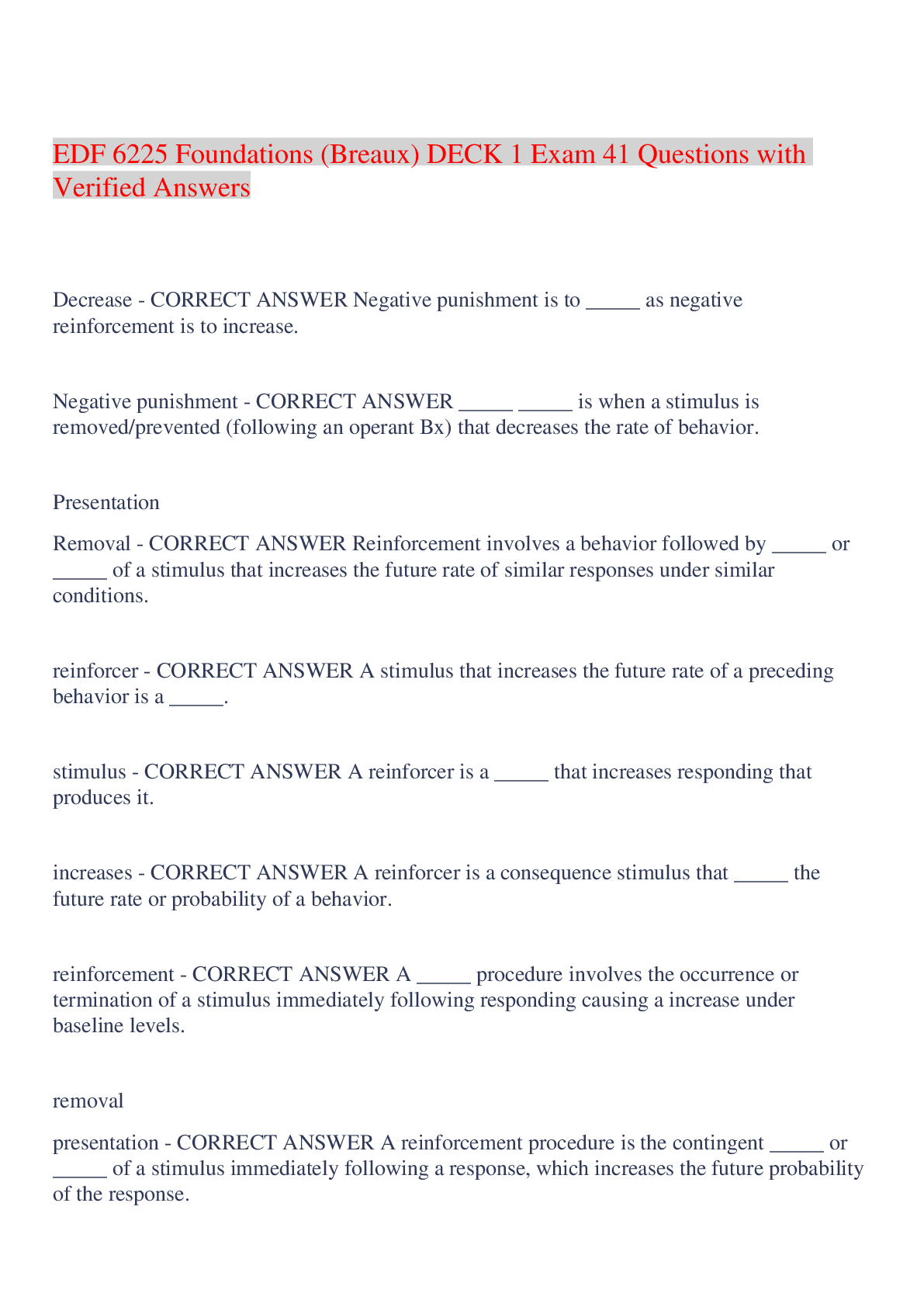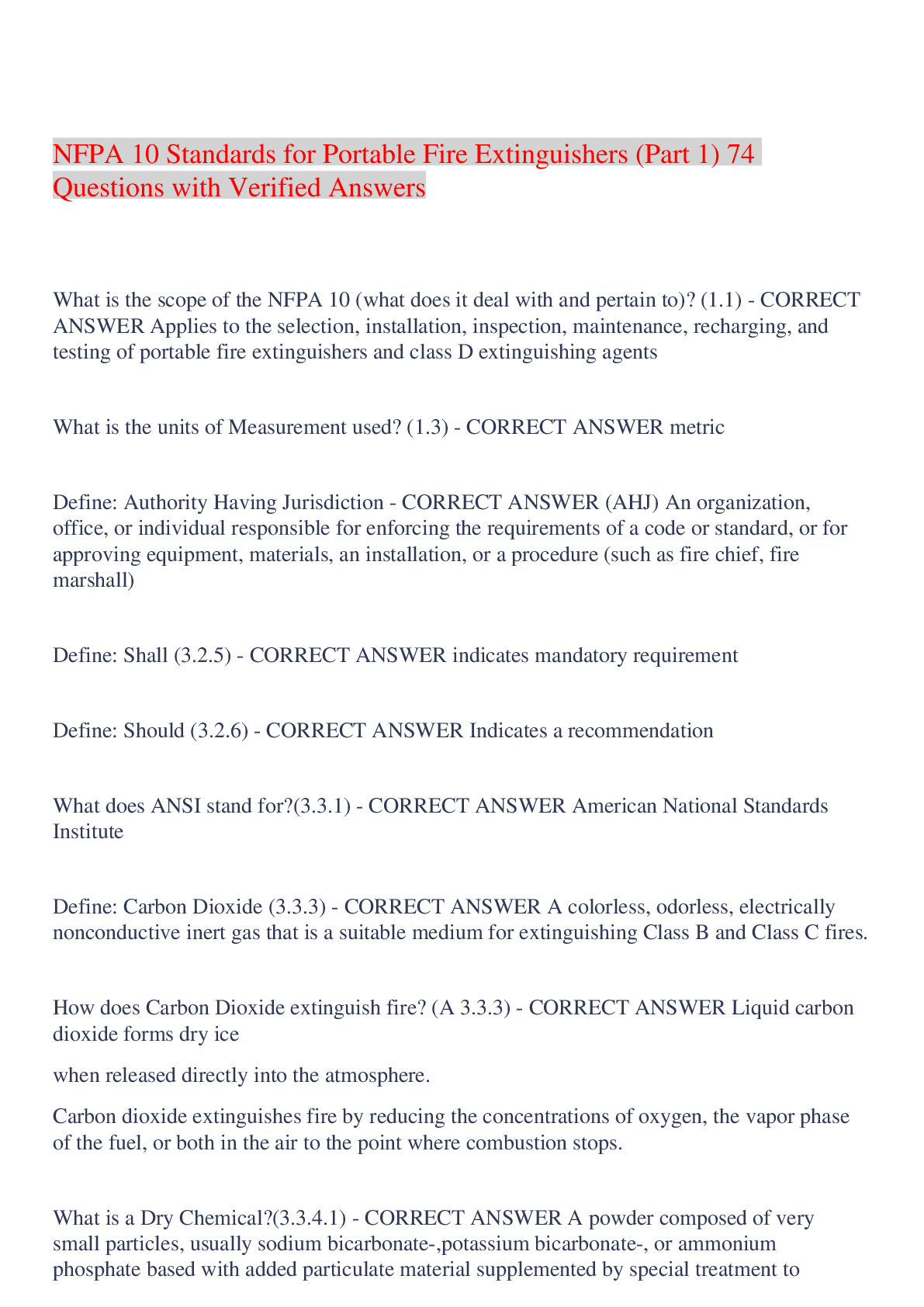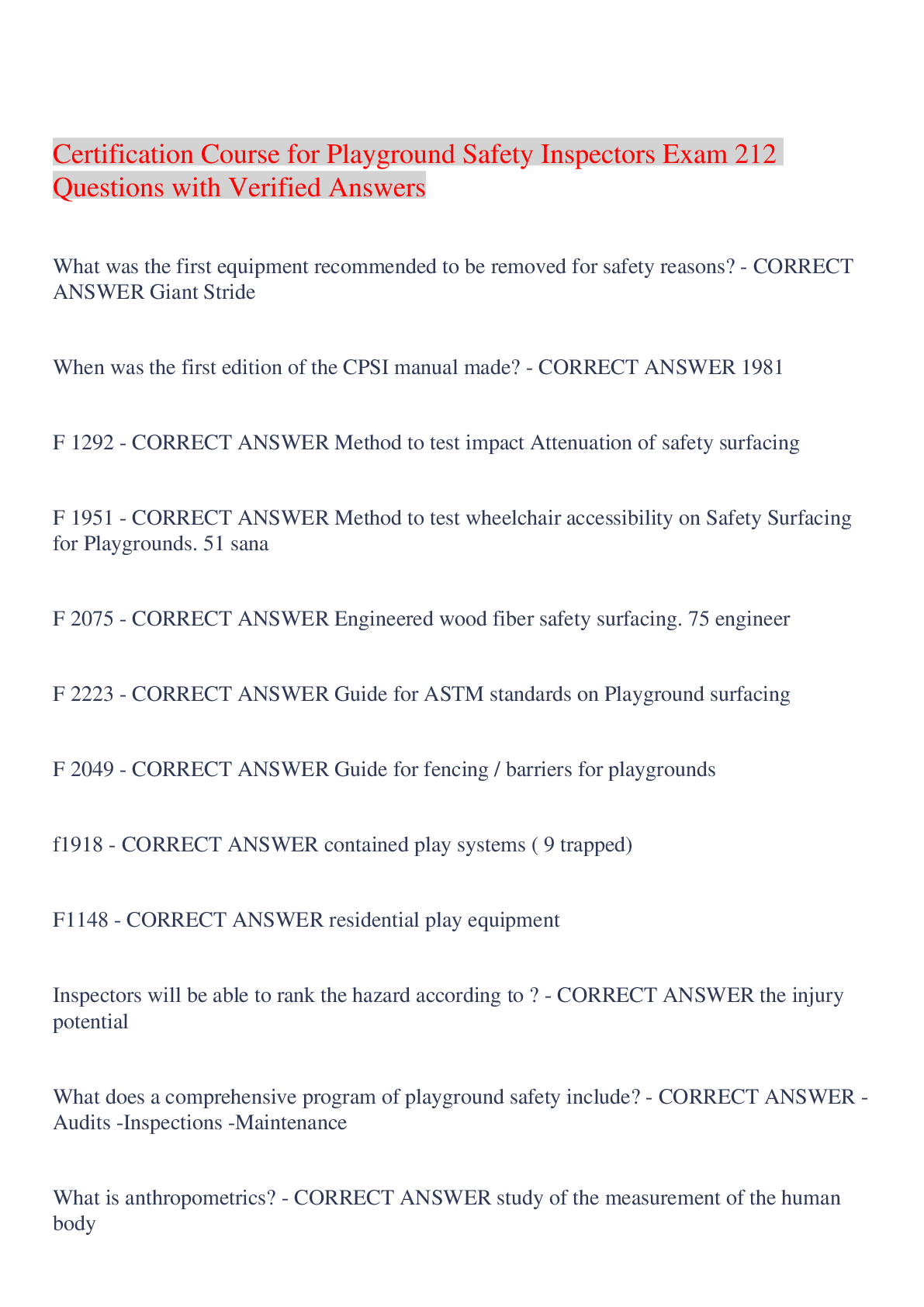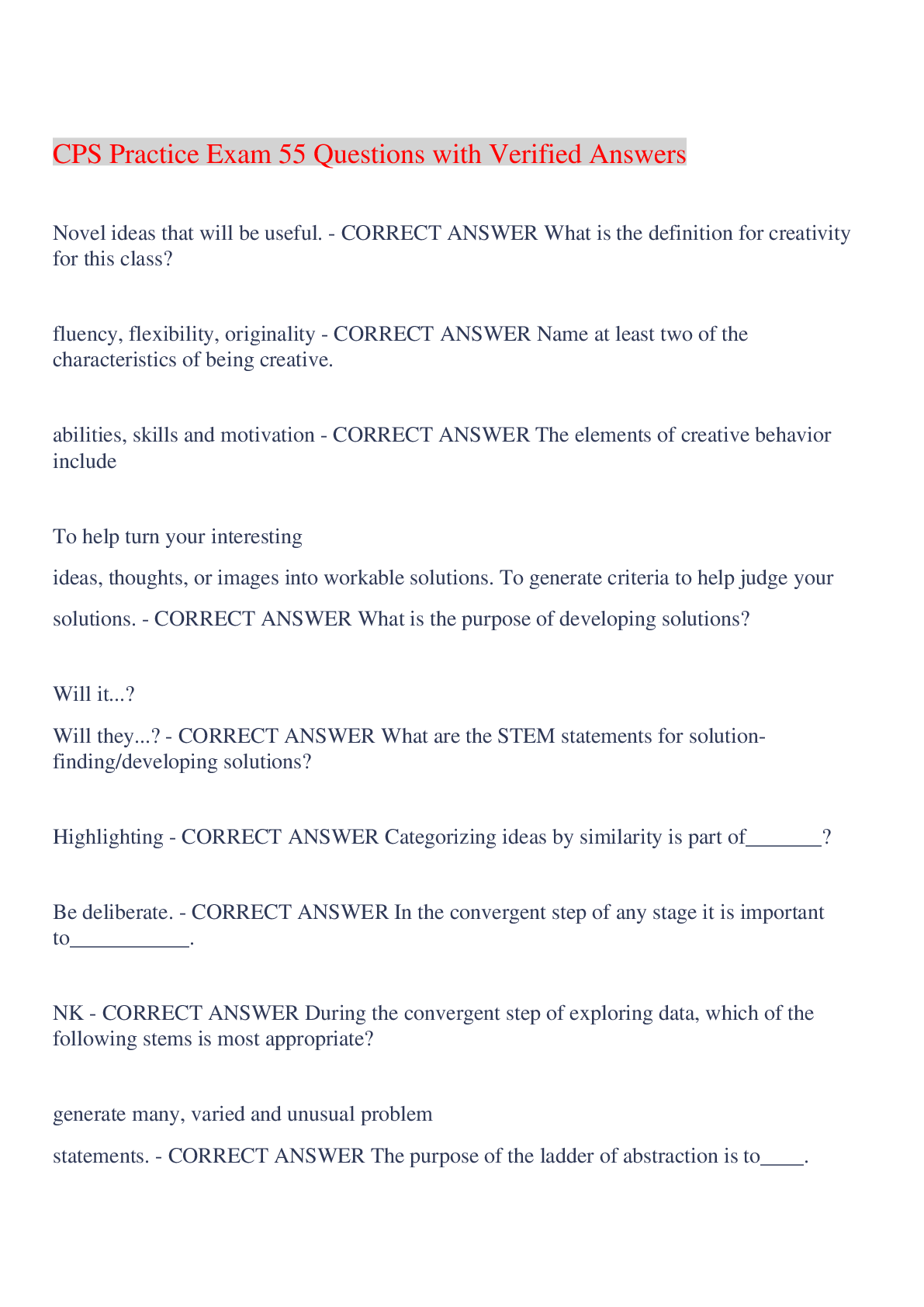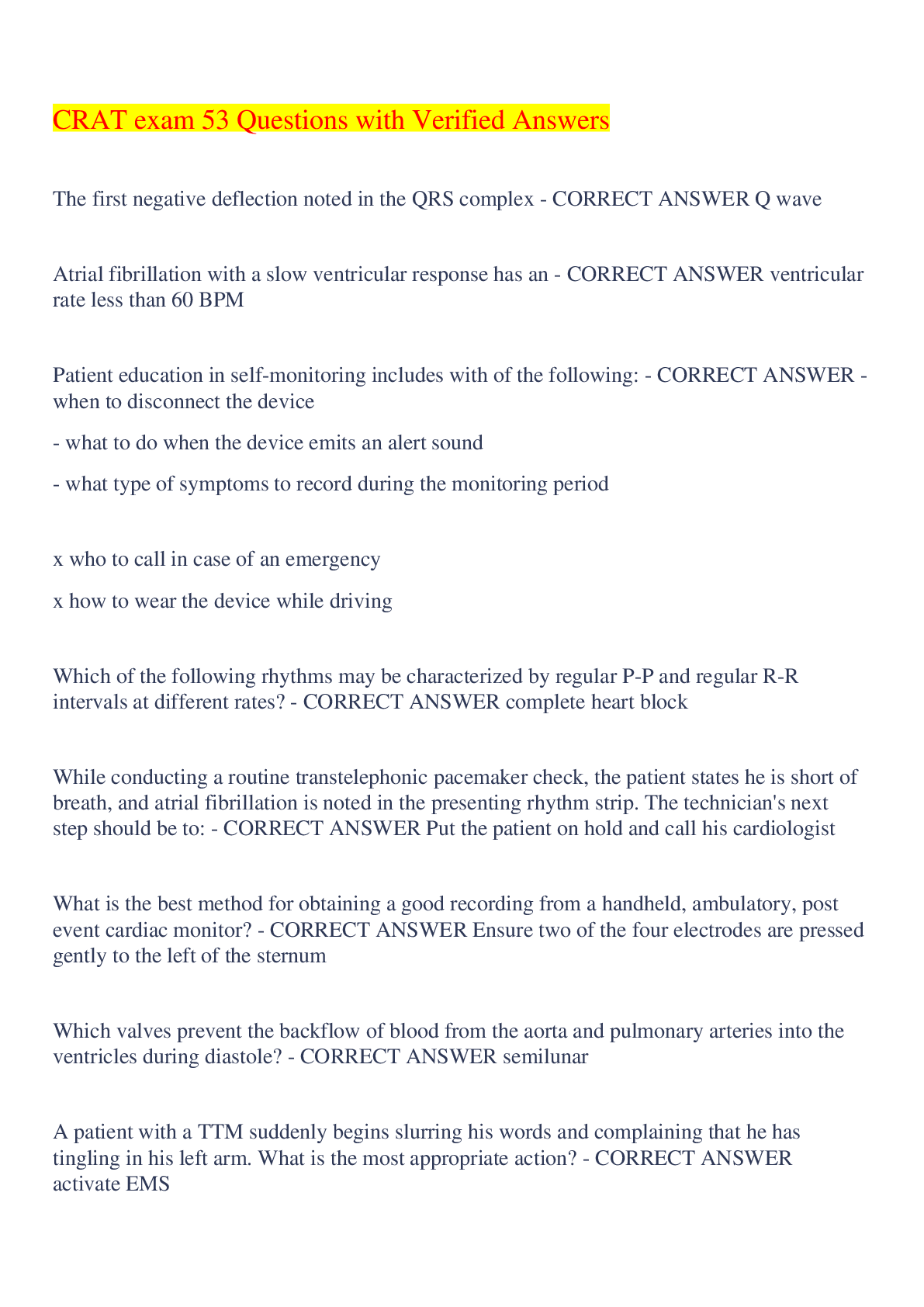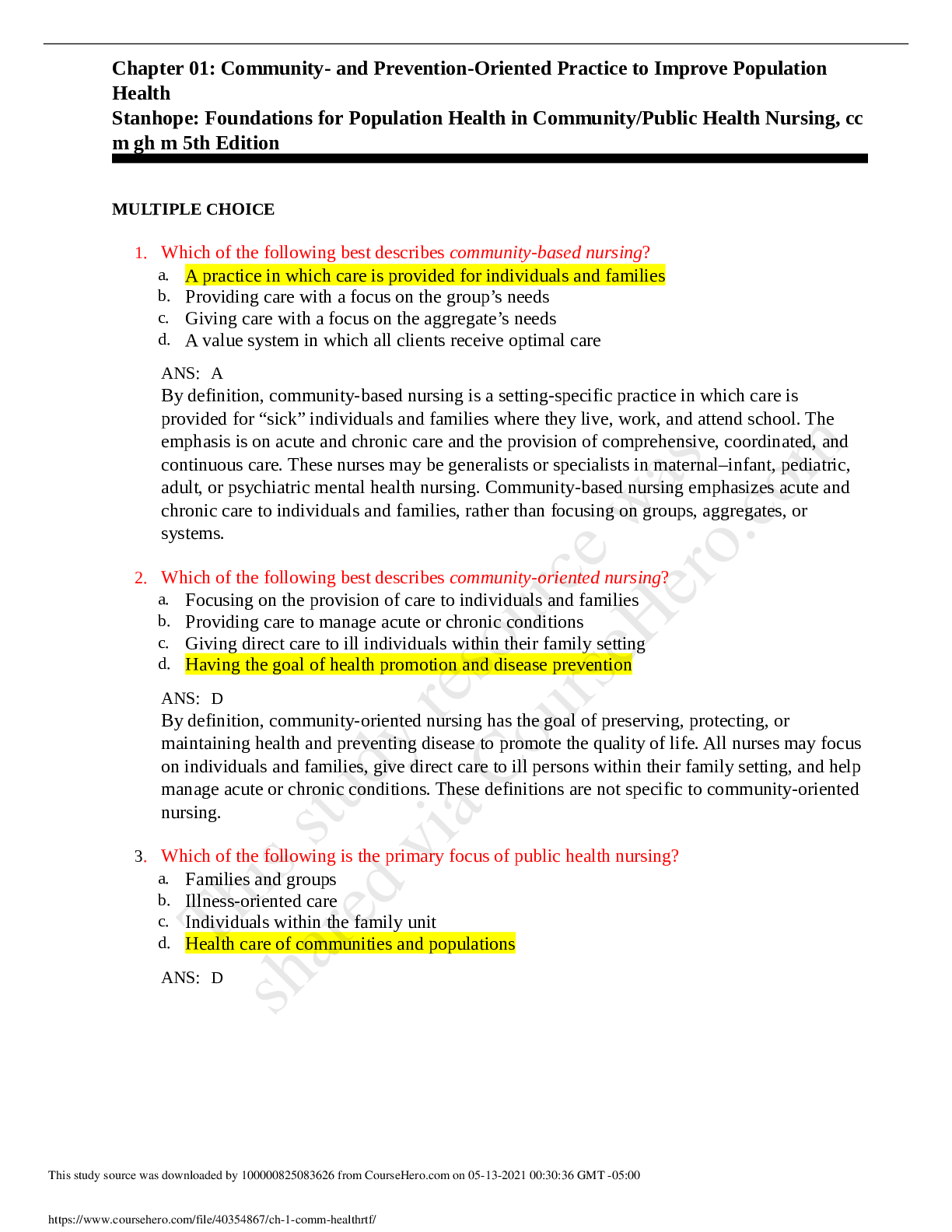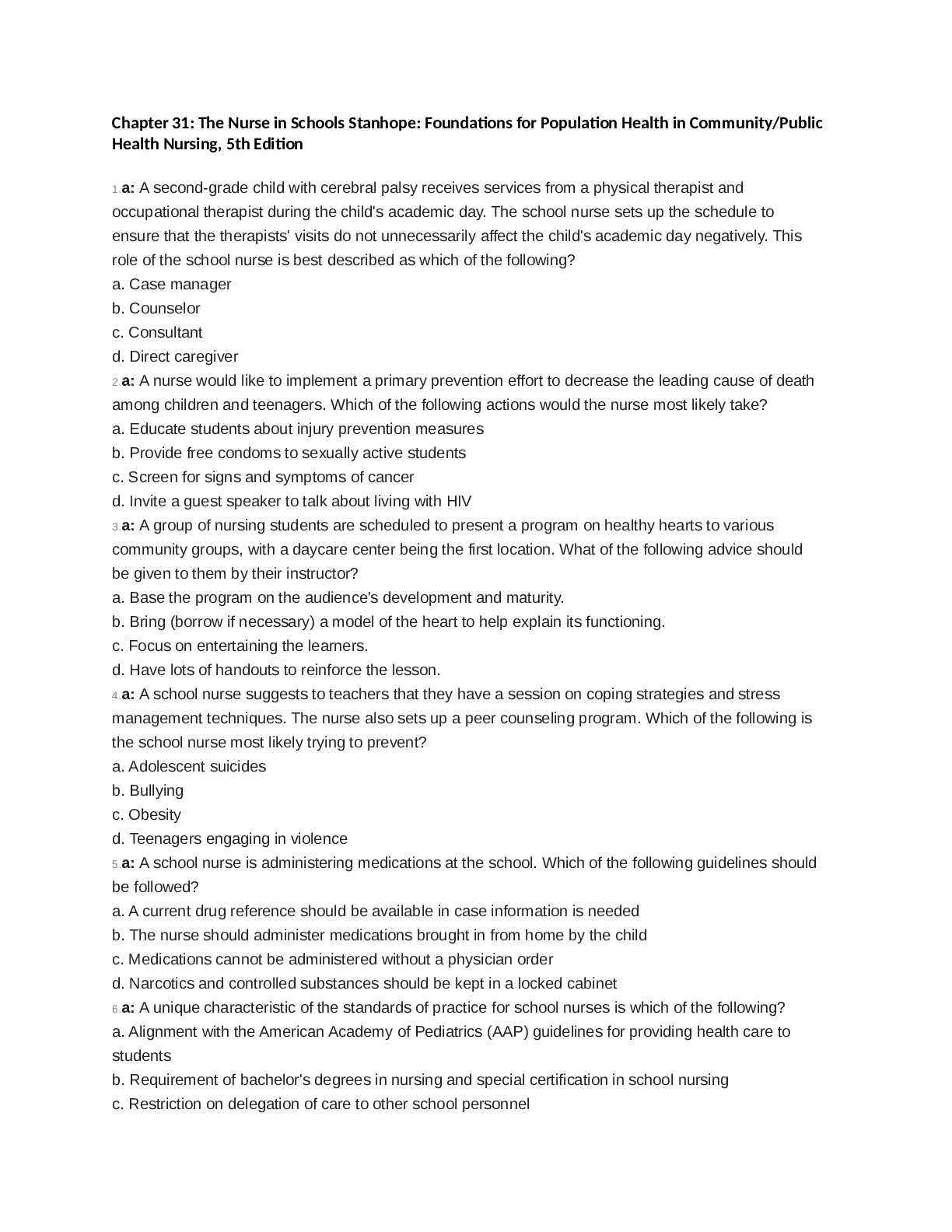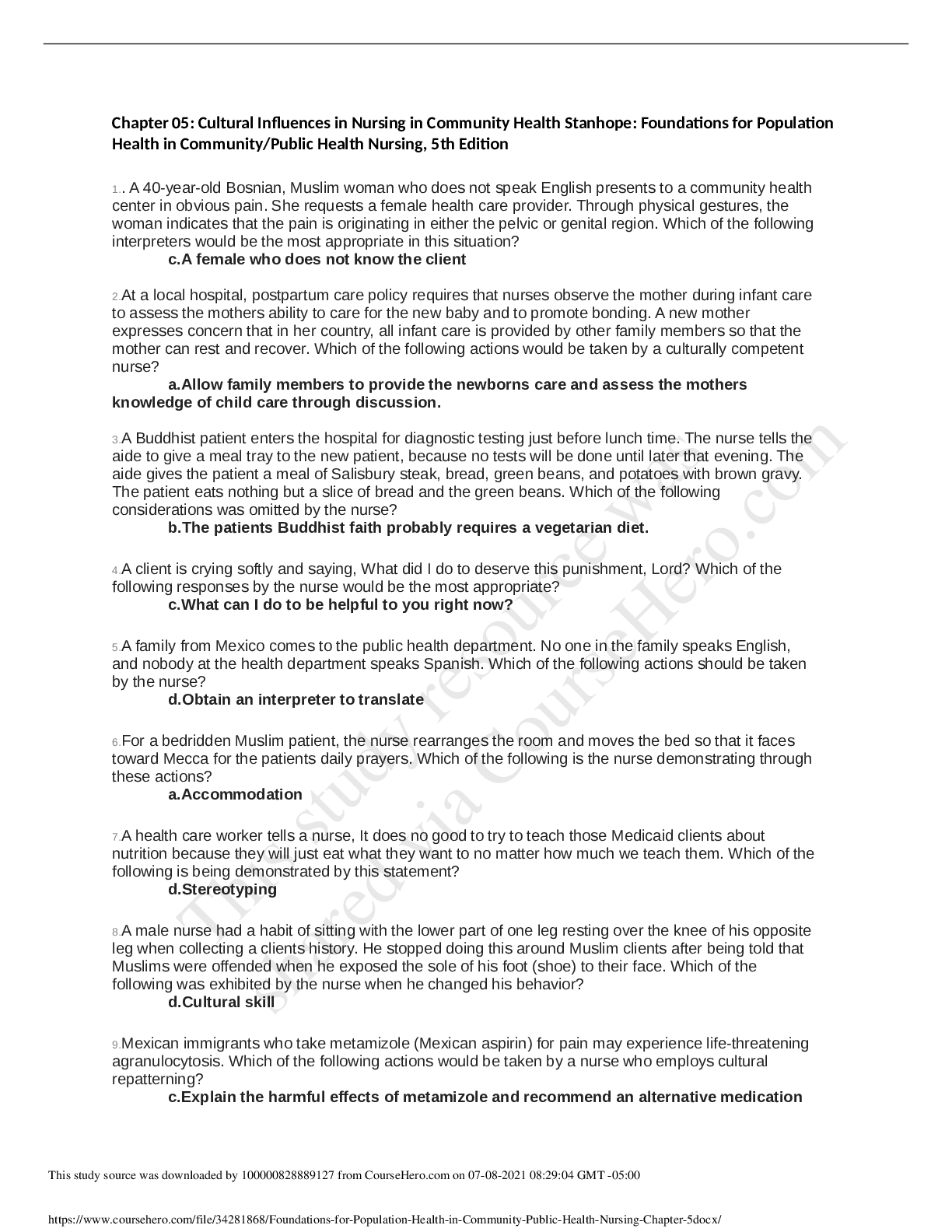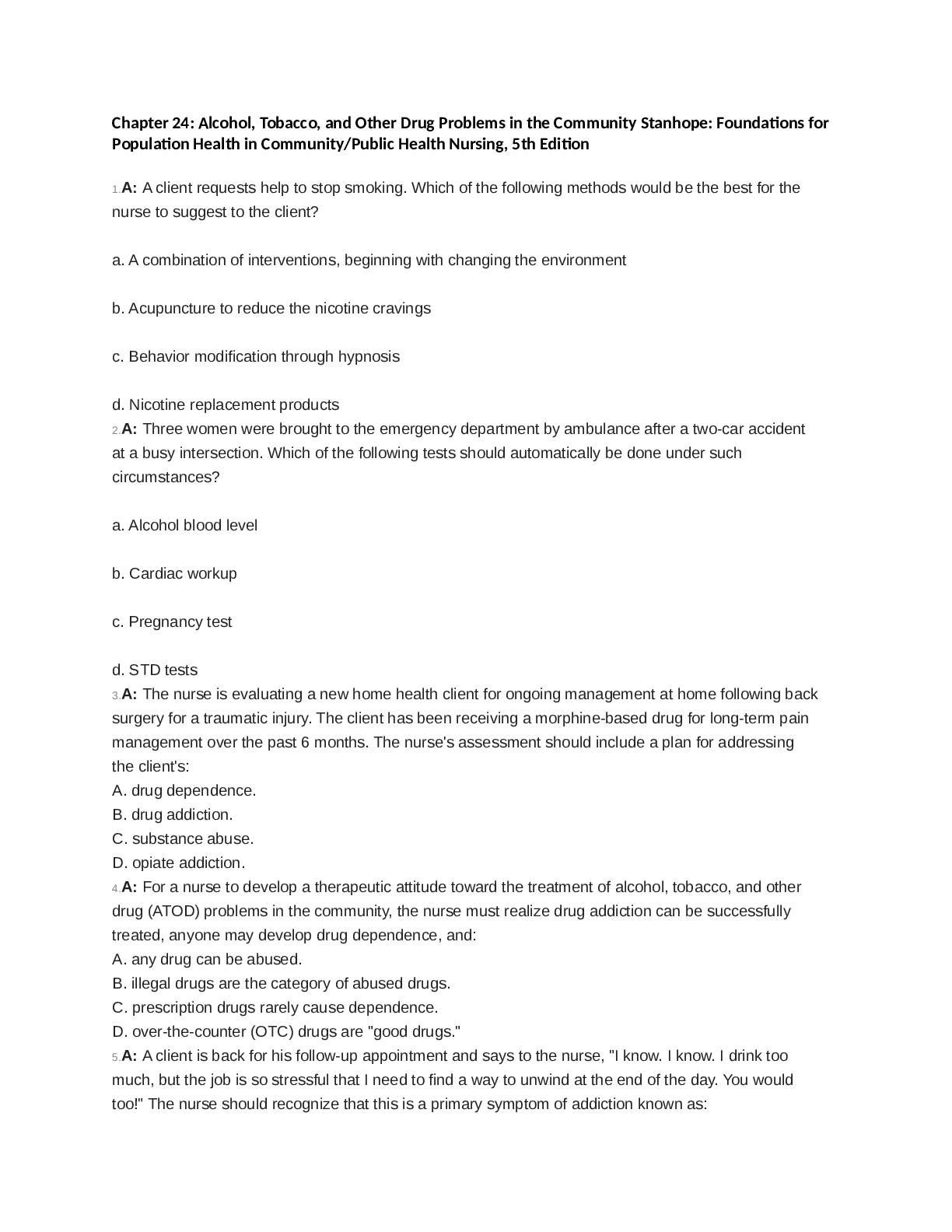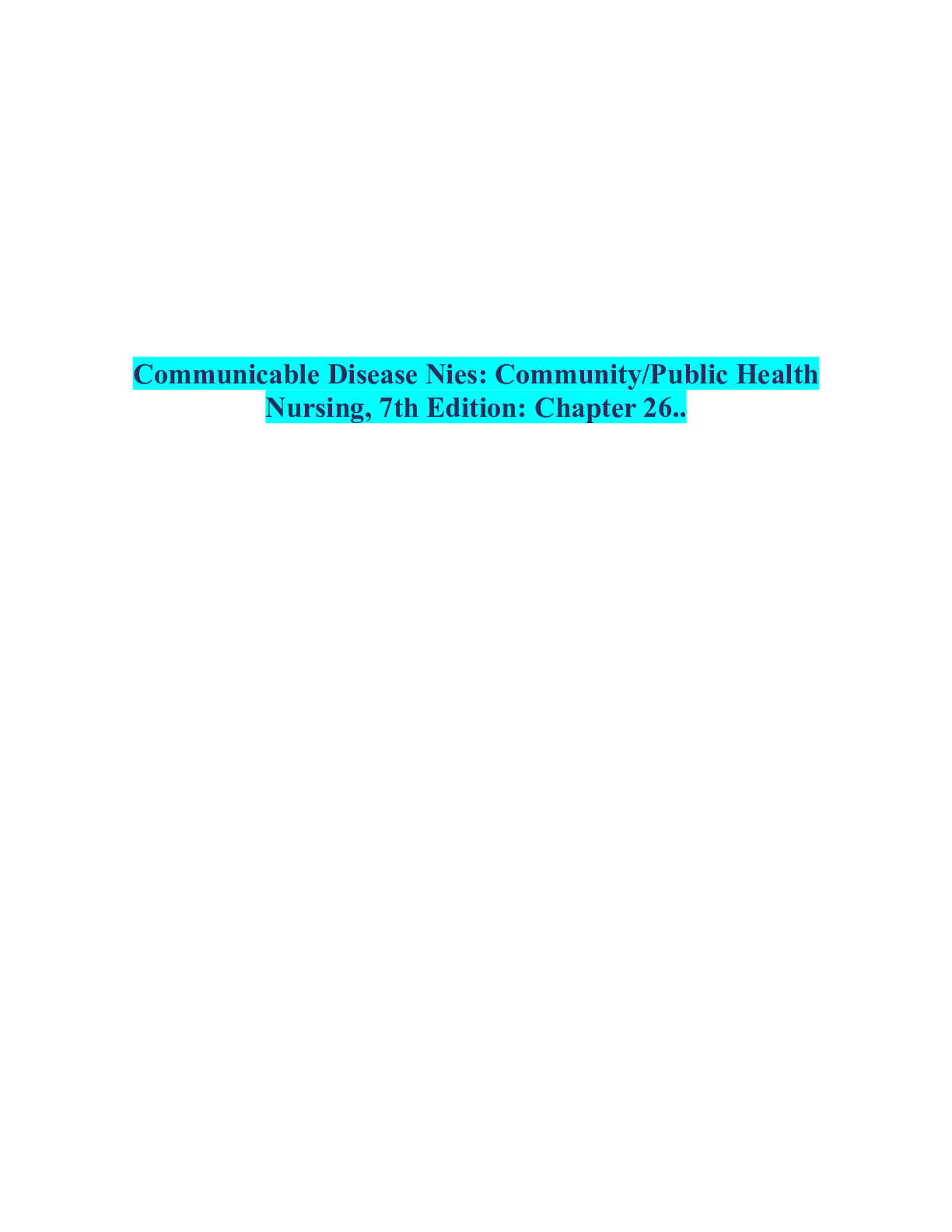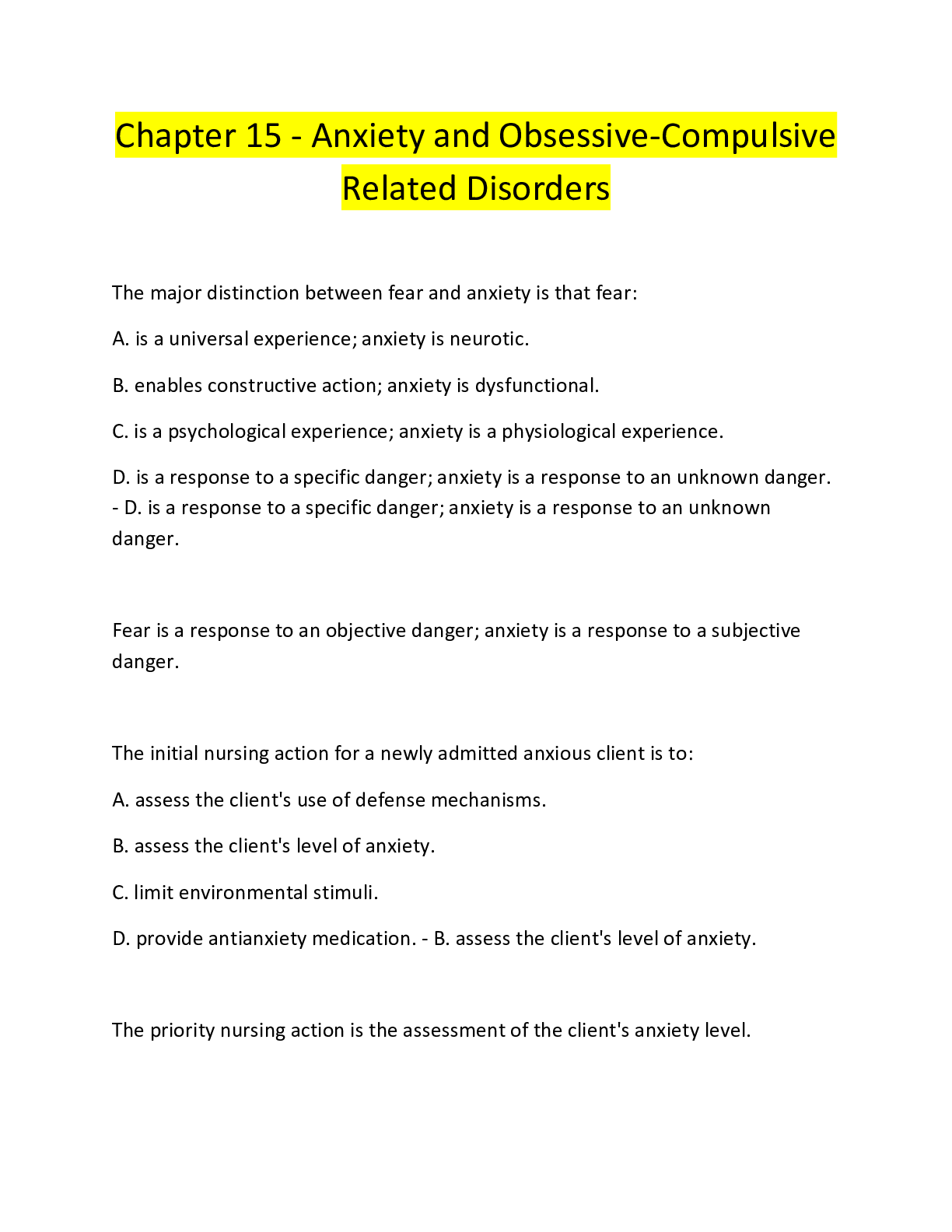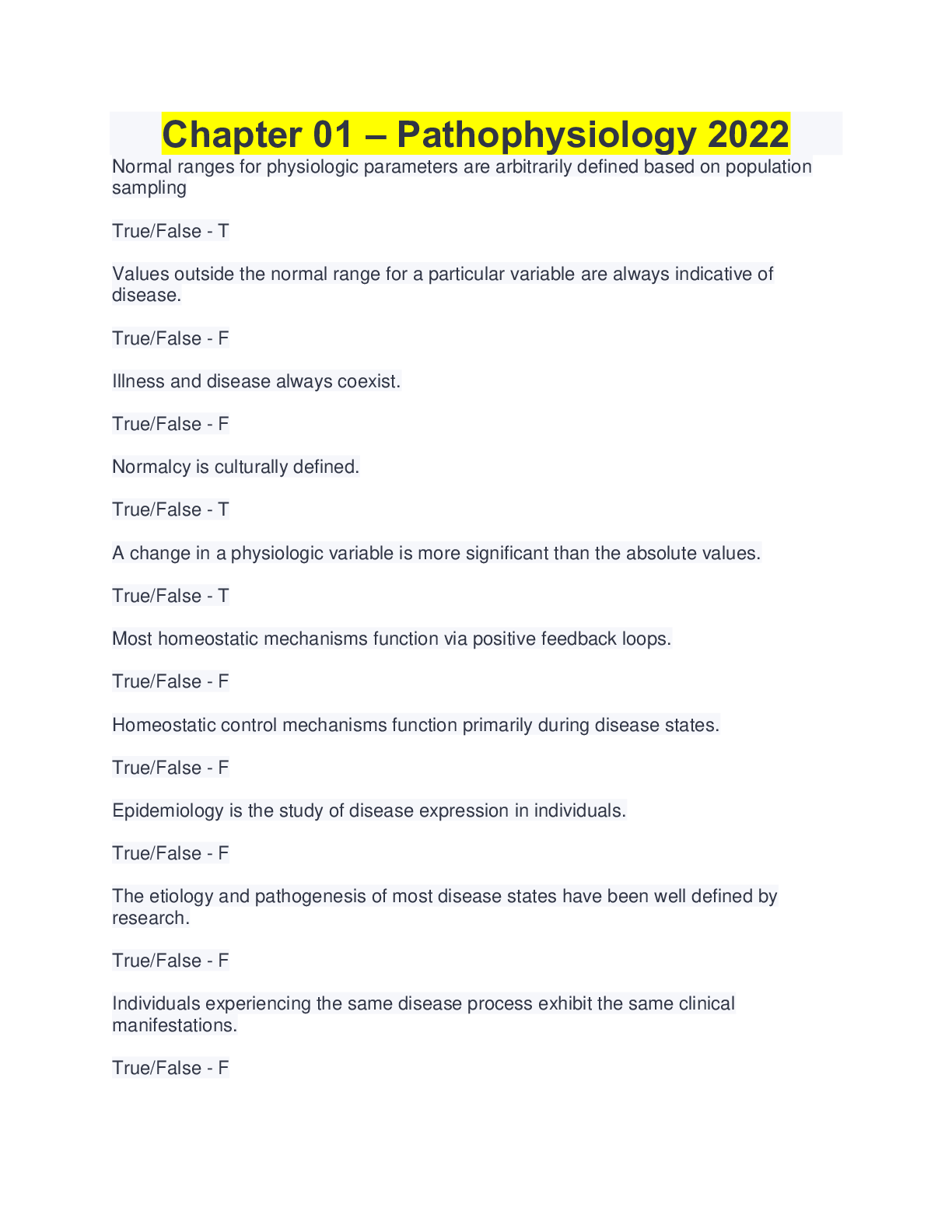*NURSING > EXAM > Chapter 07: Government, the Law, and Policy Activism Stanhope: Foundations for Population Health in (All)
Chapter 07: Government, the Law, and Policy Activism Stanhope: Foundations for Population Health in Community/Public Health Nursing, 5th Edition,100% CORRECT
Document Content and Description Below
Chapter 07: Government, the Law, and Policy Activism Stanhope: Foundations for Population Health in Community/Public Health Nursing, 5th Edition MULTIPLE CHOICE 1. Which of the following best... defines the word politics? a. The art of influencing others b. The outcome of governmental policies c. A provision of power for making decisions d. The result of legislative action ANS: A Politics is the art of influencing others to accept a specific course of action. Political action results in governmental policies and legislation. The result of legislative action typically is done in the form of laws and policies. The provision of power for making decisions is typically assumed by the government. 2. Which of the following activities is completed by the executive branch of the federal government? a. Administration of policy b. Interpretation of policy c. Proposal of policy d. Passage of policy ANS: A N R I G B.C M The executive branch administUers SandNreguTlates pOolicy. The legislative branch proposes policy (as bills) and passes policy (as laws). The judicial branch interprets laws. 3. A nurse meets with a senator to lobby for passage of a bill to increase funding for interpreter services. With which of the following branches of the government is the nurse working? a. Constitutional branch of government b. Executive branch of government c. Legislative branch of government d. Judicial branch of government ANS: C The legislative branch of government is composed of the Senate and the House of Representatives. The legislative branch identifies problems and proposes and then debates, passes, and modifies laws to address those problems. There is not a constitutional branch of the government. The executive branch administers and regulates policy. The judicial branch interprets laws. 4. Which of the following statements best describes why the federal government has become involved in health care? a. The states asked the federal level to become involved. b. Because of rising costs to the states, the federal budget needed to be used to pay for necessary services. c. The Constitution gives the federal government the power to promote the general welfare. d. This step was necessary to standardize care on a national level. ANS: C One of the first constitutional challenges to a federal law passed by Congress was in the area of health and welfare in 1937. The Supreme Court (judicial branch) reviewed the legislation in question and determined, through interpretation of the Constitution, that such federal governmental action was within the powers of Congress to promote the general welfare. According to Article I, Section 8 of the U.S. Constitution Congress has multiple roles in relation to health care: provide for the general welfare, regulate commerce among the states, raise funds to support the military, and provide spending power. Thus, Congress was within its role to become involed in health care and was not asked to do so by the states or used to standardize care on the national level. 5. A client states to the nurse, “I have heard the Affordable Care Act is supposed to help improve the health care I receive, but so far I have seen no benefits from this legislation.” Which of the following statements would be the best reply by the nurse? a. “Maybe you have not directly seen the changes; however, several things have changed in health care because of this bill.” b. “It will take years to see any effects from the act because of the delays in implementation of the changes.” c. “This legislation will primarily improve care for the elderly and poor populations, so this is why you may not have seen any benefits.” d. “The way health care operates at the federal and state levels has changed, so most individuals will not see any direct impact.” ANS: A It is possible that unless one has been in a situation where changes have been made, that one may not realize any of the effNeUctsRoSfIthNisGlaTwB. .ThCeOgMoal of the Affordable Care Act was to improve the health of the nation and access care. Several changes to health care have already been made because of this legislation, and more changes will continue in the future. Multiple provisions of the act will affect individuals and families. 6. What was the significance of the 1979 Surgeon General’s report? a. It planned the goals and priorities for the entire Veterans Administration medical system. b. It vastly increased funding for health promotion activities. c. It identified the use of tobacco as a cause of lung cancer. d. It created national goals for promoting health and preventing disease. ANS: D The 1979 Surgeon General’s report began a focus on preventing disease and promoting health for all Americans. It was a national effort with all levels of government, as well as other interested parties, involved. The 1979 report did not plan goals and priorities for the Veterans Adminsitration medical system, rather it looked at health of all Americans. There was no funding asociated with the report. It addressed prevention of disease and promotion of health for multiple diseases, not just lung cancer. 7. A nurse is advocating for the public health department to increase the number of public health nurses that it employs. Which of the following factors should the nurse emphasize? a. Providing disease investigation training b. Providing research opportunities c. Providing leadership experiences d. Providing salaries commensurate with responsibilities ANS: D Through the input of the Division of Nursing’s National Advisory Council for Nursing Education and Practice (NACNEP), the Division of Nursing sets policy for nursing nationally. A few of the factors indicated by the NACNEP that need to be in place to support the public health nurse role are competitive salaries commensurate with responsibilities, experience in health promotion and prevention, long-term trusting relationships in the community, and a commitment to social justice and eliminating health disparities. The Division of Nursing’s National Advisory Council for Nursing Education and Practice (NACNEP) did not emphasize the importance of providing disease investigation training, research opportunities, or leadership experiences. 8. A nurse is determining whether a hospital has the right to require infected patients to be isolated against their will. To which type of law will the nurse refer? a. Common law b. Constitutional law c. Legislation and regulation d. Judicial law ANS: B Constitutional law provides the right to intervene in a reasonable manner to protect the health, safety, and welfare of the citizenry. State power concerning health care is called police power. This power allows states to act to protect the health, safety, and welfare of their citizens. The state must show that it has a compelling interest in taking actions, especially actions that might infringe on individual rights. The state can isolate an individual to prevent an epidemic, even though this infringes onNinUdRivSidIuNalGriTghBts.. CThOeMcommunity’s rights are deemed more important than the individual’s rights when there is a threat to the health of the public. Judicial law, based on court and jury decisions, and the principles of common law (precedent, justice, fairness, respect for an individual’s autonomy, and self-determination) are both used by court’s as the basis to make a decision and do not relate to having the right to isolate a patient. Legislation is law that comes formthe legislative branches of the government and regulations are specific statements of law related to defining or implanting individual pieces of legislation. Neither are as important in this case as the constitutional law of the police power of the states in regards to isolation of a patient. 9. Who is responsible for determining the scope of practice for registered nurses? a. American Nurses Association b. Federal legislators c. State legislators d. US Department of Health and Human Services ANS: C Health care practitioners are subject to the laws of the state in which they practice. The state nurse practice acts define the practice of professional nursing, identify the scope of nursing practice, set educational qualifications, and determine legal titles. The nurse practice act is governed by legislators in each state. The American Nurses Association, U.S. Department of Health and Human Services, and federal government do not determine the scope of practice for nurses, this responsibility is the role of state governments. The U.S. Department of Health and Human Services is the agency most heavily involved with the health and welfare of U.S. citizens. 10. Which of the following statements by a client indicates a lack of understanding regarding an appropriate reason to sue for professional negligence? a. “Because the health care workers didn’t turn my mother every 2 hours, she developed bedsores.” b. “I received permanent nerve damage because they would not remove a cast that was too tight.” c. “My daughter wasn’t given a call light, and for a whole shift no one checked on her condition.” d. “They amputated the wrong leg during surgery.” ANS: C Professional negligence, or malpractice, is defined as an act (or failure to act) that leads to injury. All of the choices specify an injury, except for “My daughter wasn’t given a call light, and for a whole shift no one checked on her condition,” in which case the care was substandard but no injury resulted. The incorrect responses all specify an injury whereas professional negligence, or malpractice, is defined as an act (or failure to act) that leads to injury. 11. 11. N R I G B.C M Which of the following statements best describes the law in relation to clinical practice by nursing students? a. Students are considered certified until licensure is obtained. b. Students are expected to meet the same standard of care as the professional nurse. c. Students are not legally liable for errors because they practice under the license of their instructor. d. Students have a scope of practice determined by the nurse practice act. ANS: B Nursing students need to be aware that the same laws and rules that govern the professional nurse apply to them as well. Students are expected to meet the same standard of care as that met by any licensed nurse practicing under the same or similar circumstances. Although it is true that students cannot practice outside the scope of practice determined by the nurse practice act, they also cannot perform the tasks and responsibilities of the licensed practitioner within the scope of practice until they have received adequate knowledge; therefore, the scope of practice for the student is determined by the instructor, based on the student’s level of education. 12. A nurse wishes to see a bill passed to support funding for the use of interpreters for clients with limited English proficiency. Which of the following would be the best time for the nurse to request support from the local senator, who is not on the committee that is reviewing this bill? a. When the bill is first assigned to a committee b. When the bill is discussed and debated within the committee c. When the bill moves out of committee to be heard by the entire Senate d. When the bill passes the Senate and moves to the House of Representatives ANS: C Once the bill is passed by committee and moves out of committee to be heard by all senators, it will be important to contact this senator, who will then be in a position to act on it. Contacting the senator when the bill is first assigned to the committee or is being discussed and debated within the committee is too early. The nurse would not want to wait until after the vote has been taken in the Senate because it would then be too late for the senator to act. 13. The state board of nursing has written new regulations to clarify in a more concrete manner what the nurse practice act allows and requires. Which of the following effects will this change have on nurses in this state? a. None, because they are just helpful guidelines for maximum safety b. None, because they just give specifics that may change over time c. Major, because prudent nurses would follow such regulations d. Major, because these rules and regulations have the effect of law and must be obeyed ANS: D When the legislature passes a law and delegates its oversight to an agency, it gives that agency the power to make regulations. Because regulations flow from legislation, they have the force of law. Whether prudent or not, nurses are obligated to practice consistent with these regulations. All nurses have the responsibility to follow the changes that are in place by legislation. They are laws that must be followed, not guidelines. 14. A bill with the potential to deNcUreRasSe IheNalGthTcBar.e CseOrvMices is passed by Congress. Which of the following actions should the nurse take to influence the bill’s implications? a. Exercise veto power by calling for petitions from health care agencies. b. Contact the regulatory agency and participate in public hearings. c. Call members of congress to request that they rescind the legislation that was passed. d. Discuss the change in services with the administrators at the hospital. ANS: B Once a bill is passed and becomes law, it is too late to influence congressional members to change their vote; however, it is not too late to influence the outcome of the vote because the nurse can influence how the law is regulated. An agency typically writes the regulations that control how the law is implemented in more specific detail. Often this process can be just as important as lobbying against a bill because it shapes the final implementation of the law. Health care agencies do not have the ability to veto a bill. After a bill has been passed it is too late to contact members of congress. Calling the hospital will not change the implications of the bill. Contact must be made with the regulatory agency in order to influence how the law is regulated. 15. Which of the following agencies has the most influence on the health and welfare of US citizens? a. Agency for Healthcare Research and Quality (AHRQ) b. Centers for Disease Control and Prevention (CDC) c. US Department of Health and Human Services (USDHHS) d. World Health Organization (WHO) ANS: C As the agency to which most health care legislation is delegated, the USDHHS is the agency most heavily involved with the health and welfare of citizens. The AHRQ and CDC are divisions of the USDHHS. WHO’s policy-making body provides policy options and guides but not laws. In the textbook, only the USDHHS is discussed regarding its responsibility for Medicare and Medicaid through the Centers for Medicare and Medicaid Services (CMS). 16. Which of the following laws established programs for provision of health services for women and children and supported community-oriented nursing practice? a. Early Periodic Screening and Developmental Testing (EPSDT) Initiative b. Healthy People 2000 Initiative c. Sheppard-Towner Act d. State Child Health Improvement Act (SCHIP) ANS: C The Sheppard-Towner Act of 1921 played an important role in the development of public health policy, public health nursing, and social welfare policy. Of particular importance was the fact that it established standards for programs to serve women and children and made nurses available to provide these services in the community setting. Within the Sheppard-Towner Act was a provision to start the EPSDT initiative. SCHIP provides insurance for children and families who cannot otherwise afford health insurance. Healthy People 2000 focuses on promoting health and preventing disease for all Americans. MULTIPLE RESPONSE 1. Which of the following descrNibUeRthSeIsiNgnGifTicBan.cCe OofMthe passage of The Public Health Threats and Emergencies Act? (Select all that apply.) a. It funded ongoing activities of the public health system. b. It led to improved water quality and food safety guidelines. c. It included funding for public health activities. d. It validated that the public health system was prepared for terrorism. ANS: B, C The Public Health Threats and Emergencies Act was the first federal law to comprehensively address the public health system’s preparedness for bioterrorism and other infectious disease outbreaks and signaled the beginning of renewed interest in public health as the protector for entire communities. The focus of this law was to address emerging threats to the public’s health and authorize the Secretary of HHS to take appropriate response actions during a public health emergency, including investigations, treatment, and prevention. It did not support the ongoing activities of public health. It did not validate the public health system was prepared for terrorism. 2. Which of the following best describe the importance of the World Health Organization (WHO) to the United States? (Select all that apply.) a. Provides daily information on disease occurrences. b. Establishes international standards for antibiotics and vaccines. c. Creates international legislation regarding international cooperation. d. Supports national programs to fight disease. ANS: A, B Some WHO services that benefit all countries (including the United States) are providing day-to-day information service on the occurrence of internationally important diseases; publishing the international list of causes of disease, injury, and death; monitoring adverse reactions to drugs; and establishing international standards for antibiotics and vaccines. Individual countries can request assistance with strengthening the delivery of health services, supporting national programs to fight disease, and training health workers—which the United States does not. WHO can suggest but cannot legislate to individual countries. 3. Which of the following activities are the responsibilities of the Centers for Disease Control and Prevention (CDC)? (Select all that apply.) a. Conduct research to enhance disease prevention. b. Detect and investigate infectious disease problems. c. Develop and advocate public health policies. d. Publish national goals for promoting health and preventing disease. ANS: A, B, C The mission of the CDC is to promote health and quality of life by preventing and controlling disease, injury, and disability. To monitor health, the CDC will detect and investigate health problems, conduct research that will enhance prevention, and develop and advocate sound public health policies and other prevention strategies. The safety and health of the workplace is the specific responsibility of OSHA. The CDC cannot write or pass legislation. The USDHHS published national health goals in Healthy People 2020. 4. A nurse is visiting a state legislator to encourage the legislator to vote for a particular health bill that the state nurses association has endorsed. Which of the following actions would be most important for the nurse to complete? (Select all that apply.) a. Allow the legislator or stafUf to SaskNqueTstions. O b. Be friendly and engage in small talk so that rapport can be established. c. Be aware that legislators are well informed; don’t insult the legislator by stating information that is obvious. d. Have a handout that summarizes all the major points in support of the bill. ANS: A, D Legislators might not be well informed about every issue, so they need and want important information. The nurse should allow time for questions or clarification of information shared and have the material on a handout for the legislator’s convenience. It is also helpful to invite the legislator to attend nursing conferences or meetings where health issues will be discussed. The nurse should not waste time with small talk but briefly present his or her stand, emphasizing other nurses who support the bill, because numbers count. Legislators might not be well informed about every issue, so they need and want important information that the nurse can provide. 5. A nurse would like to become involved in political action. Which of the following actions would be most appropriate for the nurse to accomplish this goal? (Select all that apply.) a. Become a member of the state nurses association. b. Be friendly with everyone, whether supportive or not of your ideas. c. Don’t expend time on local activities but ask to be appointed on the state level. d. Focus all your efforts on your specialty practice area and your employment site act. ANS: A, B A nurse wishing to become politically involved should begin by joining the state nurses association, networking with others involved, and volunteering to serve on committees or in offices. Be friendly and network to increase your knowledge beyond your own workplace or specialty and seek opportunities to share expertise with others. Becoming involved locally is a good opportunity to start becoming involved in political action and allows for networking at the local level. Seeking opportunities beyond one’s workplace or specialty area allows the nurse to gain additional knowledge and share expertise in specialty area with others. 6. A nurse is testifying at a committee meeting about a health bill. Which of the following actions should be taken by the nurse? (Select all that apply.) a. Briefly describe personal education, experience, and expertise in the area. b. Discuss how the bill affects more than just nurses. c. Include factual data and, if possible, statistical information in visual form. d. Include the names of famous persons in the media who agree with you. ANS: A, B, C Language must be simple and carefully chosen to convey information to listeners and to avoid professional jargon. The nurse must share a bit of personal education, experience, and expertise to be seen as a credible source. The testimony must go beyond just nursing’s interest and include accurate, credible data. The data must be accurate and credible which may not be the case when getting names from the media. NURSINGTB.COM [Show More]
Last updated: 1 year ago
Preview 1 out of 15 pages
Instant download

Buy this document to get the full access instantly
Instant Download Access after purchase
Add to cartInstant download
Reviews( 0 )
Document information
Connected school, study & course
About the document
Uploaded On
Sep 18, 2021
Number of pages
15
Written in
Additional information
This document has been written for:
Uploaded
Sep 18, 2021
Downloads
0
Views
45

